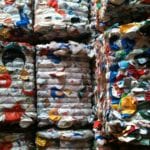Senator Carson, Representative Tucker, and members of the Joint Standing Committee on Environment and Natural Resources, my name is Sarah Nichols and I am the Sustainable Maine Director for the Natural Resources Council of Maine (NRCM). I appreciate this opportunity to speak in strong support of LD 2104. I have provided a folder attached to my testimony with detailed information in support of this legislation. My remarks will focus on two points.
First, this bill will provide Maine towns and taxpayers with the financial support they need to preserve and strengthen municipal recycling programs.
According to the Maine DEP, about 30-40% of the materials being managed by municipalities is packaging waste. Maine taxpayers pay at least $16 million each year to manage this material through recycling or disposal. Property taxpayers and towns have no control over how much packaging material is landing in our waste stream. They simply pay the bill. Some towns can’t afford to do so anymore and are having to curb or cancel their recycling programs because disposal in a landfill or waste-to-energy plant is cheaper than recycling. Further, they are receiving a lot of packaging material that isn’t readily recyclable in Maine.
Producers of packaging currently have no responsibility to assist with these costs, and they have no incentive to design their packaging so that it is more readily recyclable. LD 2104 addresses these flaws with our current recycling system.
The bill internalizes the cost of end-of-life recycling for packaging waste, rather than forcing those costs onto taxpayers—which makes all the difference. Shifting the costs away from taxpayers will literally enable towns to retain their recycling programs. And there would be producer funding available for education and infrastructure development, too.
Second, the bill will establish here in Maine a system of shared responsibility for packaging waste that will reduce waste and increase recycling rates.
Although Maine established a recycling rate goal of 50% more than three decades ago, our current recycling rate is only 36%. But recycling rates are much higher in jurisdictions that have adopted Extended Producer Responsibility for Packaging laws such as would be established by LD 2104. This fact was demonstrated by Resa Dimino, Senior Consultant at Resource Recycling Solutions, who presented to this Committee as part of the technical expert briefing held on January 22nd.
As shown on the attached chart from Resa Dimino’s presentation:
• Residential recycling rates in Canadian provinces immediately increased by an average of 8% following adoption of EPR for Packaging laws;
• Average recycling rates in these provinces after 2-4 years increased by 17%; and
• Average recycling rates after 8-10 years increased by 29%.
This data tells us that adoption of LD 2104 likely is the single most important action that Maine lawmakers can take to greatly increase recycling rates in Maine.
Further, data from jurisdictions with EPR for Packaging laws shows that the cost per capita for recycling is about the same as it is here in Maine, yet those jurisdictions have much higher recycling rates. In other words, they get far more recycling bang for their buck. This evidence is illustrated in the table attached, which shows that producer-funded recycling programs are more effective than Maine’s taxpayer-funded system.
In closing, I would like to emphasize that LD 2104 is strongly supported by Maine people and municipalities.
Nineteen municipalities, representing more than 211,000 Maine residents, have adopted municipal resolutions urging Maine to adopt an EPR for Packaging law. More than 1,600 Mainers have signed a petition in support of EPR for Packaging. Additional information about this level of support is in the folder of materials attached to my testimony.
I appreciate the work of this Committee and urge you to vote Ought to Pass on LD 2104, so that Maine communities and taxpayers receive the support they need to maintain and strengthen recycling in Maine, now and into the future. I would be happy to answer any questions that you may have.
Read attachments submitted with testimony.
Maine towns that have adopted municipal recycling resolutions.













